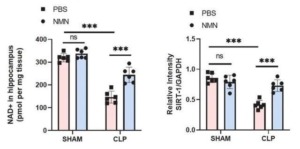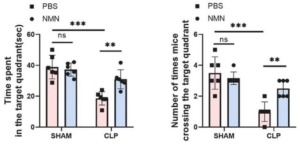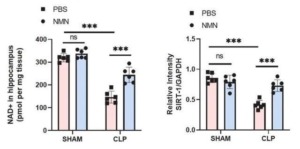Scientific research shows that while the immune system does its best to fight infection, it doesn’t always treat the body kindly. When overactive or dysregulated, the immune system can attack the body’s organs and cause severe damage. For example, the brain, one of the body’s most precious organs, can experience cognitive impairment when overloaded with inflammation.
Recently, researchers from the Naval Medical University of China discovered that NMN can combat brain inflammation that causes blurred memory.
According to “Redox Biology,” researchers found that NMN activates SIRT1 to combat inflammation and oxidative stress in the immune system. In septic mice, they discovered that NMN increased NAD+ and SIRT1 levels in the hippocampus and was associated with improved learning and memory.
These findings suggest that NAD+-mediated activation of SIRT1 can alleviate inflammation-induced cognitive impairment.

Experiment overview:
In a mouse model of sepsis, NMN improved cognition and reduced inflammation by activating the longevity-related enzyme SIRT1 (sepsis with multiple abscesses and a longer course is called sepsis, which is a disease that triggers systemic inflammation. disease):
- Injection of 500 mg/kg NMN into the blood of septic mice increased NAD+ and SIRT1 levels in the hippocampus, the brain area consolidating memory.
- NMN treatment reduces cognitive impairment caused by sepsis-mediated inflammation.
- Treatment with NMN reduces brain inflammation and oxidative stress—a defect in which inflammation wreaks havoc on organs and tissues at the cellular level.
- NMN can fight brain inflammation and memory deficits
Sepsis is a life-threatening disease – various pathogenic bacteria invade the blood circulation, grow, multiply, produce toxins in the blood, and promote inflammation. Therefore, to induce sepsis in mice, researchers surgically punctured the mice’s cecum (the part of the intestine that contains feces and bacteria. Puncturing the cecum will cause the bacteria to be released into the bloodstream), thereby triggering septic shock.
After induction, the researchers found that the levels of NAD+ and SIRT1 in the hippocampus of septic mice were lower. At the same time, because NMN is known to restore NAD+ levels and activate SIRT1, the researchers injected NMN into septic mice. This increases NAD+ and SIRT1, suggesting that NMN can enter the brain and raise NAD+ to start SIRT1.
NMN increases NAD+ and SIRT1 in the brain.
NAD+ (left) and SIRT1 (right) levels are reduced in the hippocampus of septic mice (CLP, pink) compared with normal mice (SHAM).
However, NMN-treated septic mice (CLP, blue) did not show as much reduction.
To assess the cognitive abilities of septic mice, the researchers used the Morris water maze test – teaching the mice to navigate and remember the location of an escape platform.
The results showed that compared with normal mice, septic mice made more errors and took longer to find the platform, indicating that hippocampal-mediated learning and memory are disrupted. NMN improved the ability of septic mice to find the platform more easily, indicating enhanced cognitive ability.

NMN enhances learning and memory.
Compared with normal mice (SHAM), septic mice (CLP, pink) take longer to find the escape platform in the target quadrant of the Morris water maze (left) and have a higher error rate (right).
However, NMN-treated septic mice (CLP, blue) took less time and did not make as many errors.
The researchers measured hippocampal inflammation and oxidative stress to explore how NMN enhances cognition in septic mice. Oxidative stress is caused by excessive reactive oxygen species (ROS) levels, which can damage proteins, lipid membranes, and DNA. Importantly, inflammation causes oxidative stress.
The results showed that the levels of pro-inflammatory molecules such as IL-6 and ROS were significantly increased in the hippocampus of septic mice. However, NMN significantly reduced these inflammatory molecules and ROS, indicating that NMN has significant anti-inflammatory and oxidative stress effects.

NMN reduces inflammation and oxidative stress. Compared with normal mice (SHAM), septic mice (CLP, pink) show increased levels of the inflammatory marker IL-6 (left) and increased levels of ROS (right), indicating oxidative stress. However, NMN-treated septic mice (CLP, blue) did not show nearly high levels of inflammation or oxidative stress.
SIRT1 is an enzyme that consumes NAD+ as fuel. With sufficient fuel (e.g., from NMN metabolism to NAD+), SIRT1 can initiate a series of processes associated with longevity. For example, overactivating SIRT1 in the brain (hypothalamus) has been shown to extend the lifespan of mice.
To clarify whether SIRT1 mediates the effects of NMN in septic mice, the researchers repeated their experiments, but this time without SIRT1 involved (to do this, they used a drug that inhibits SIRT1 activity). They found that blocking SIRT1 disabled NMN’s cognitive-enhancing, antioxidant, and anti-inflammatory effects. These findings suggest that NMN counteracts inflammation-induced cognitive impairment by activating SIRT1.
- NMN can assist in anti-inflammation
Overall, the results of this study from China’s Naval Medical University suggest that NMM can reduce brain inflammation and mitigate any cognitive impairment caused by an inflamed hippocampus. While sepsis is an extreme form of inflammation, inflammation can also occur in response to injury and aging. By inflammation, we mean the age-related increase in low-grade chronic inflammation, which is thought to underlie many chronic diseases, including neurodegenerative and cardiovascular diseases. For some people, certain foods or environmental toxins can even trigger inflammation, including encephalitis.
Additionally, studies have shown that NMN reduces inflammation in the brain and rodents’ skin, gut, lungs, and fatty tissue. NMN activates SIRT1 through NAD+ production, improving mitochondrial health and reducing cell ROS production. Increasing NAD+ levels in immune cells may also reduce inflammation by restoring a dysregulated immune system. Therefore, when our immune system goes haywire, and inappropriate inflammation occurs, NMN can restore energy homeostasis to affected cells and relieve tissue inflammation.


Leave A Comment